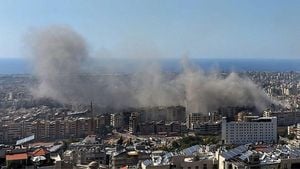Recently, geopolitical tensions have reached new heights as Russia demonstrates its military might with the launch of advanced missile systems amid the Ukraine conflict. The world is watching closely as the narrative around this brutal and protracted war shifts once again, sparking fears of broader international conflict.
On November 20, 2024, Russian forces claimed deployment of the new Oreshnik intermediate-range ballistic missile, which was recently tested against Ukrainian targets, causing significant concern among Western allies. This new missile, which Putin boasted travels at speeds of up to Mach 10, was purportedly launched from the Astrakhan region and hit military facilities around Dnipro, Ukraine. This marked the first-ever use of such advanced technology on the battlefield, underscoring Russia's commitment to escalate military actions against Ukraine and, by extension, NATO allies. Undoubtedly, this rapid development positions the conflict as one of increasing global complexity.
President Vladimir Putin's recent pronouncements framed the situation as part of what he called a "global" war against Ukraine, unapologetically asserting Russia’s readiness to target countries providing military assistance to Ukraine. "We believe we have the right to target the military facilities of any nation assisting Ukraine’s military operations against us," he declared. Such statements have only amplified fears of what military conflict might escalate to—a potential hot war involving direct confrontations between major world powers.
The response from Ukraine's President Volodymyr Zelenskyy has been staunchly defiant. Denouncing the missile strikes as emblematic of Russia’s desperation, Zelenskyy remarked, "Today, our insane neighbor has once again shown what they truly are, and how they despise dignity, freedom, and human life itself." Ukraine’s military, empowered by support from Western allies, has begun employing longer-range missiles against Russian targets, intensifying the combativeness of this already bloody confrontation.
Western leaders reacted with alarm to these developments. NATO spokespersons reiterated their commitment to assisting Ukraine against Russian aggression, emphasizing the need for defensive measures and support to resist Moscow's ambitions. Yet, skepticism remains about the frequency with which Russia might use these cutting-edge weapons. Some analysts maintain these experimental missiles are scarce, and their deployment won’t become routine. Nevertheless, the fact remains: the very presence of such capabilities signifies shifting balances of power.
Matthew Savill, director of military sciences at the Royal United Services Institute, was cited noting the development's extraordinary nature. He asserted, "This missile’s reach far surpasses anything previously utilized, raising alarms around international security provisions and local capabilities." This sentiment encapsulates the feelings of many analysts and regional officials as hostilities increase unpredictably.
But the situation is not merely military; there's also significant economic fallout. With Russia's missile tests sparking instability, global markets reacted sharply. Crude oil prices surged over concerns of supply disruptions, reaching $70 per barrel. Natural gas prices also climbed, with futures increasing significantly as demand spikes amid the impending winter. Analysts draw connections between these rising costs and the conflicts, linking them back to the heightened military engagements observed.
Across Europe, leaders are grappling with the ramifications of the conflict on their home fronts as they balance public sentiment against the need for continued support for Ukraine. The increasing toll of the war on civilian lives and infrastructure within Ukraine has raised ethical questions about military intervention and support.
U.S. officials have also weighed in, emphasizing their dedicated support for Ukraine. Karine Jean-Pierre, White House spokeswoman, remarked, "The escalation at every turn is coming from Russia." Meanwhile, London’s response conveyed similar sentiments, reaffirming the importance of continued assistance to Ukraine.
Compounding fears were unverified reports of North Korean troops being deployed to support Russian military efforts, adding fuel to the fire for those anticipating wider conflict. Analysts and military experts regard North Korean involvement as particularly troubling, with potential ramifications extending far beyond the immediate area of the conflict, touching on U.S. security concerns.
Overall, the conversation surrounding the conflict has shifted sharply, reflecting the dual nature of military and economic escalation. Military analysts assert the necessity for strategic recalibrations by both NATO and Ukraine, as the current operations depict broader operational and ethical dilemmas.
Putin’s recent declaration of the conflict’s global dimensions presents challenges for international diplomatic solutions, with many wondering how world leaders will navigate this treacherous political minefield amid rising global tensions. The clock is ticking, and the international community faces testing times as it attempts to avert any missteps leading to outright warfare. The underlying tone echoes worries about escalation—both militarily and economically—stirring fears not just for Ukraine, but for global security as well.
America’s strategic position similarly faces scrutiny, as diplomatic engagements and military advice continue to evolve with the situation. With recent missile launches prompting immediate discussions about how to respond, maintaining joint resolve among allies could prove pivotal.
On top of this complex web of events, the Russian ambassador to the UK accused London of directly engaging by supplying arms to Ukraine, raising stakes between the two nations and complicity discussions among Western nations. With Britain asserting its commitment to help Ukraine, the ambiguity around military engagements increases the potential for clashes.
Legal experts are evaluating the ramifications of these military decisions under international law, debating whether actions taken could be justified under humanitarian principles or if they violate norms about intervention and sovereignty.
All eyes remain firmly focused on Ukraine as tensions escalate, and the world watches to see if these developments tip the scales toward all-out war. What was once considered strictly regional now mirrors the dynamics of the Cold War, where alliances and military capacity remain critically intertwined. The question on everyone’s mind resonates: Has conflict reached such depths, and will rational discourse prevail, or will the fuses of war ignite without warning?
Given the situation at hand, there seems to be no clear end to the conflict as both sides gear up for continued combat with no sign of retreat. The coming weeks and months could be decisive, shaping the future of the region and possibly the world, as nations grapple with the prospect of war on an unprecedented scale.



